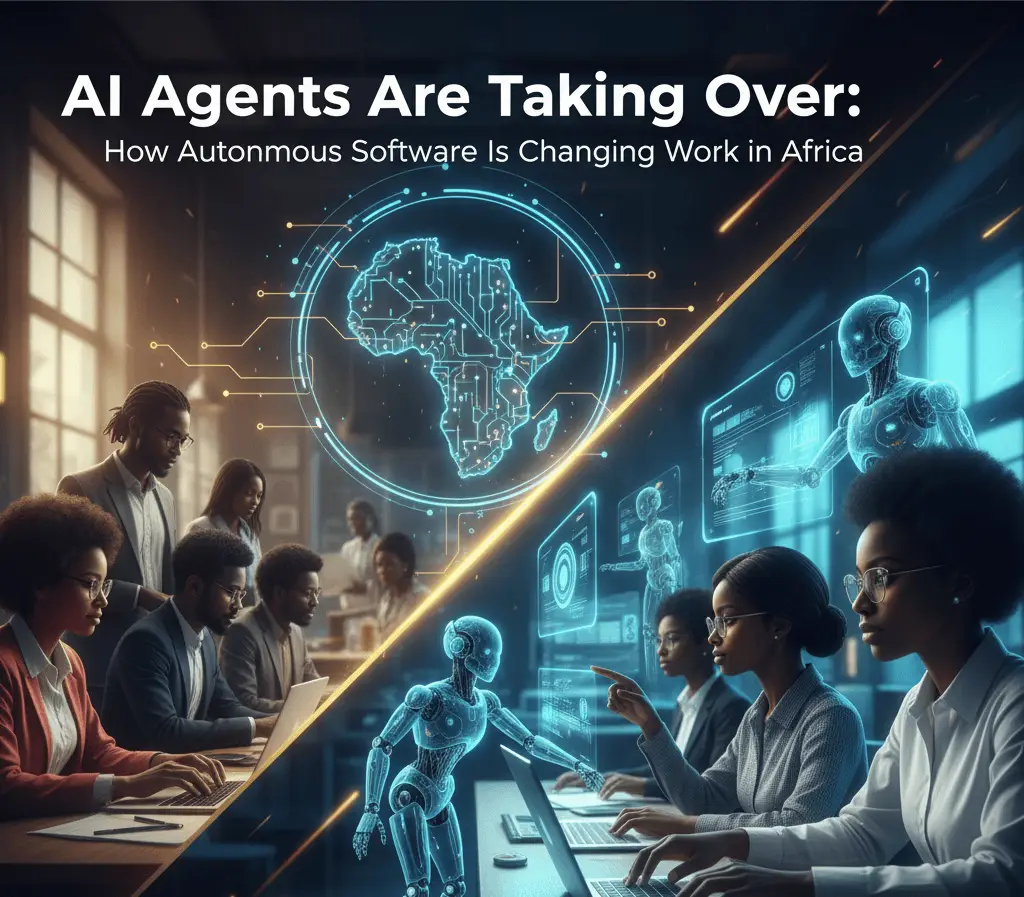AI Agents Are Taking Over: How Autonomous Software Is Changing Work in Africa
AI agents now act on goals rather than waiting for instructions which is very refreshing to note. This article explains how they work in our daily duties, which industries will change first, and what Ghana and other African countries must do to benefit.

Introduction: A Quiet Revolution in Automation
A few years ago, artificial intelligence mostly meant chatbots or simple automation. By 2025, the focus has shifted to AI agents. These are systems that do not just reply to prompts. They plan actions, execute tasks, and learn from results. For many businesses in Africa, that change is not theoretical. It is practical and urgent.
AI agents can reduce manual work and speed up decision making. For small firms and public services, the benefits are clear. The challenge lies in building trust and ensuring the systems fit local needs.
What Exactly Are AI Agents?
An AI agent is software that pursues objectives on its own. It combines data gathering, reasoning, and action. Unlike a static bot that follows set rules, an agent adapts. It may use a language model to reason, then call tools or APIs to act.
Examples include a marketing agent that researches trends and publishes content, a recruitment agent that screens candidates, and a customer support agent that resolves routine issues automatically.
The Global Shift Toward Autonomous Software
Major platforms now offer agent-like features. Teams use them to write code, analyse data, and run campaigns. Venture funds are moving into this area, and analysts predict rising adoption in the coming years. The reason is cost and scale. Agents handle repeated tasks around the clock and learn from each outcome.
Why This Matters for Africa
Africa faces gaps in administrative capacity and in specialist staff. AI agents offer a route to close some of those gaps. They let small teams do the work of many people. They can improve service levels, reduce waiting times, and make small businesses more competitive.
Small businesses can scale faster
A shop in Accra or Kumasi can use an agent to manage stock, answer customers, and update listings. That reduces the need to hire extra staff and keeps operations responsive outside office hours.
Government and public services
Document checks and routine approvals can be automated. That lowers friction and may reduce opportunities for fraud.
Startups can prototype on lean budgets
Founders can deploy agents for research and outreach while they build a core team. That lets them test ideas without large payrolls.
How AI Agents Actually Work
Most agents use a simple pattern. First they gather data. Then they decide what to do. Next they act by calling tools or services. Finally they learn from the result and adjust future behavior.
We can think of four layers.
- Perception gathers input from websites, sensors, or user uploads.
- Reasoning interprets the input using an AI model or rule system.
- Action executes calls to APIs, posts content, or updates records.
- Learning measures outcomes and refines decisions for next time.
That loop runs repeatedly, which allows the agent to improve over time.
Practical Applications Emerging in Africa
Several sectors are already testing agentic automation. The list below shows plausible near term uses.
Customer support and virtual assistance
Telecoms and fintech firms are adding agents to handle queries in local languages. These systems recognise intent, fetch account data, and escalate only where human care is required.
Agriculture and resource management
Agents tied to sensors can monitor soil moisture and suggest planting times. By learning local weather patterns, they improve recommendations for each season.
Education
Virtual tutors provide explanations, create practice tests, and track student progress. They free teachers to focus on difficult topics and on classroom coaching.
Healthcare administration
Routine tasks such as appointment booking and form processing can be handled by agents. That reduces paperwork and shortens wait lists.
Business process outsourcing
BPO firms can use agents to automate data entry and scheduling. Human staff then focus on review, quality control, and client relations.
Economic and Employment Effects
Technology often removes some jobs and creates new ones. Agents are no different. For Africa, the likely outcome includes new roles in oversight, AI operations, and training.
- There will be demand for people who supervise agent outputs and handle exceptions.
- New jobs will include prompt engineering, data curation, and model training.
- Entrepreneurs will offer agent customisation services for local industries.
Education systems should add practical AI skills so workers can move into these roles quickly.
Challenges Slowing Adoption
Several factors limit how fast agents spread across the continent.
Infrastructure
Agents need reliable internet and cloud services. Coverage remains uneven in many areas, and that constrains use.
Cost
Enterprise grade systems are costly. Open source tools reduce cost but still require skilled teams to deploy them.
Language and localization
Many models are trained mostly on English. For multilingual markets we must invest in localisation to avoid errors and bias.
Ethics and trust
Decisions made by software must be fair and explainable. Without clear rules, people will resist handing sensitive tasks to machines.
Skills shortage
There are not yet enough engineers trained to build or maintain these systems. That creates dependence on foreign vendors in some cases.
Regulation and Responsible Use
Who is accountable when an agent makes a harmful choice? Is it the developer, the operator, or the company that deployed it? These are practical questions that policy makers must answer.
Some African nations are studying rules used overseas. Ghana has run consultations on ethical AI. Any sensible framework should include transparency, bias testing, and user consent.
Trust will determine whether citizens accept AI in health and finance. Responsible design and clear oversight will be essential.
Opportunities for Startups and Innovators
The most valuable work will adapt agents to local realities. A model tuned to Western markets will not always understand how business works in Accra or Lagos. Local developers who customise agents for pricing, language, and user habits will win customers.
Partnerships with universities and hubs will speed progress. Access to datasets, cloud credits, and mentors will help local teams build useful products rather than importing finished tools.
How Individuals Can Prepare
Workers should aim to work with AI, not against it. Practical steps include learning prompt design, adopting productivity agents for personal use, and building domain expertise that machines cannot replicate easily.
- Take free online courses on automation and model use.
- Experiment with personal agents for scheduling and research to learn their limits.
- Focus on skills where humans retain advantage, such as empathy and creative strategy.
- Stay flexible. The tools will change rapidly, and adaptability matters more than static skills.
Conclusion: A Continent Ready for the Next Leap
AI agents mark a shift from tools that wait for commands to systems that act on goals. They can increase efficiency, improve public services, and boost small business performance across Africa. The benefits will be greatest where governments, industry, and education coordinate on infrastructure and training.
Those who learn to use agents early will shape how work gets done in the coming decade. Africa can move from a consumer role to a creator role if it invests in local talent and in ethical frameworks for AI use.







